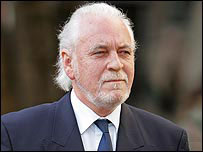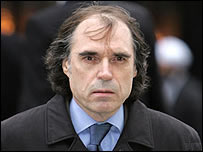
Gary Brooker, the band's lead singer, arriving at court
Released 1967
No.1 in UK charts
No. 5 in the US
Covered by Willie Nelson, Annie Lennox and Sarah Brightman
Procol HarumBeyond |
|
|
PH on stage | PH on record | PH in print | BtP features | What's new | Interact with BtP | For sale | Site search | Home |
|
Pop lyrics re-appraised by the Magazine
A Whiter Shade of Pale, a number one single in 1967, is at the centre of
a legal dispute. But what do the words
mean?
- "Great intro, uh?"
- "They nicked it from Marvin Gaye."
- "He nicked it from Bach!"
This description of Procol Harum's 1967 hit A Whiter Shade Of Pale is
from the film The Commitments, but it might also end up as an exchange in
the Royal Courts of Justice, where former members of the band are trying to
settle a royalties dispute over the song - if the legal system muddles up its
soul legends.
 Gary Brooker, the band's lead singer, arriving at court
|
PALE SIGNIFICANCE Released 1967 No.1 in UK charts No. 5 in the US Covered by Willie Nelson, Annie Lennox and Sarah Brightman |
While Judge William Blackburne ponders how to divvy up the millions at stake,
others are listening again to the lyrics of this chart-topper and asking: what's
going on here? And just how do you skip the light fandango?
Fittingly for a song with disputed authorship, A Whiter Shade Of Pale is
rich in quotations from other works, and not just the classical motif that many
hear in the arrangement: the JS Bach piece used in the cigar ads.
Even the title comes from an overheard conversation. In 1967, lyricist Keith
Reid told the Melody Maker that he was at a "gathering" where "some guy
looked at a chick and said to her, 'you've gone a whiter shade of pale'. That
phrase stuck in my mind."
That's fantastick
Pop music is full of such snappy malapropisms: Ringo's back-to-front phrases
were known as "Ringoisms" by his fellow Beatles, and resulted in songs including
A Hard Day's Night and Eight Days A Week.
The result in Procol Harum's case was a pair of verbose verses which nod to
various archaisms unfamiliar to the pop charts, including The Miller (as in
Chaucer's vulgar tale told by a drunkard); vestal virgins (handmaidens to a
Roman half-goddess) and the light fandango (John Milton coined "the light
fantastick" to describe dancing in 1632; the phrase became common coinage before
being mangled, via the Spanish courtship waltz the fandango, into Procol Harum's
"the light fandango").
For the record, and bewilderingly, Reid pooh-poohs any link between "the Miller
told his tale" and The Miller's Tale; he prefers Willie Nelson's
rendition, which is mangled again into "the mirror told its tale".
Miller or mirror, it's a rum brew. The combination of dense allusion and Hammond
organ had already been patented by Bob Dylan, but he was no chart-topper. While
A Whiter Shade Of Pale was the number one single, Sgt Pepper was the
number one album - a psychedelic commercial victory for hearts and minds.
By some accounts, this is the point where pomposity set in to pop, legitimising
classical motifs and impenetrable lyrics until the Year Zero of punk. But is the
song as incomprehensible as they say?
Bawdy pun
If you stop decoding the references, a clear if woozy tale emerges: there's
dancing, a waiter brings drinks, their effects are felt, and a woman is
approached. Could it be that A Whiter Shade Of Pale is about a boozy one
night stand?
| Matthew Fisher the band's former organist |
 |
In the book Lives Of The Great Songs,
Mike Butler puts a compelling case, uncovering the song's missing words, which
are performed at gigs but which would have made the single over-long.
They begin "She said 'I'm home on shore leave', though in truth we were at sea"
and end "So we crashed dived straight way quickly and attacked the ocean bed". A
maritime metaphor climaxes in a bawdy pun, the relationship is consummated, and
the song seems... well, a little less mysterious.
It's not the lyric, though, that's in legal dispute. The keyboard player,
Matthew Fisher, is claiming royalties for the keyboard breaks which link the
verses.
The backing is certainly effective. The song is built around a descending
sequence, but so are many, from Pachelbel's Canon to The Farm's footie
anthem All Together Now. To stop it descending forever, you need a
flourish to get back up to the top, and A Whiter Shade Of Pale has a
corker.
Indeed, similar trills were used months later by Serge Gainsbourg in the more
explicit Je T'Aime... Moi Non Plus and months earlier in Percy Sledge's
When A Man Loves A Woman - which might be what the Commitments were
thinking of.
Who came up with that corker might now be a legal matter, but one that may not
matter.
Word power
Music royalties take many forms (sales, airplay, use in films and games etc),
but the names in brackets after a pop song's title are usually whoever wrote the
words, and the tune to which they're sung.
In their guide to How To Have A Number One The Easy Way, situationist
chart-toppers The KLF put this down to a Western musical tradition which
privileges words and melody, arguing that if the lawyers were "of African
descent, at least 80% would have gone to the creators of the groove".
There are exceptions, of course: Pulp, Coldplay, REM and Placebo are among the
bands who have split credits among the band members on the recording.
And how a band deals with this has seen many old friends looking daggers at each
other across the courtroom, from Spandau Ballet through The Smiths to Bob
Marley's Wailers.
None of this, however, is likely to cross your mind while you listen to the
song, whoever takes the credit. And it may be unhelpfully reductive to read it
as a half-remembered sexual liaison; plenty of songs have portrayed these,
without ending up as wedding favourites.
The Commitments ends on an imagined exchange where the band's manager explains
to Terry Wogan what he has learned and quotes from A Whiter Shade Of Pale:
- That's very profound, Jimmy! What does it mean?
- I'm [expletive deleted] if I know, Terry!
This seems unlikely to feature in Judge William Blackburne's summing-up.
|
More about A Whiter Shade of Pale |
|
|
PH on stage | PH on record | PH in print | BtP features | What's new | Interact with BtP | For sale | Site search | Home |